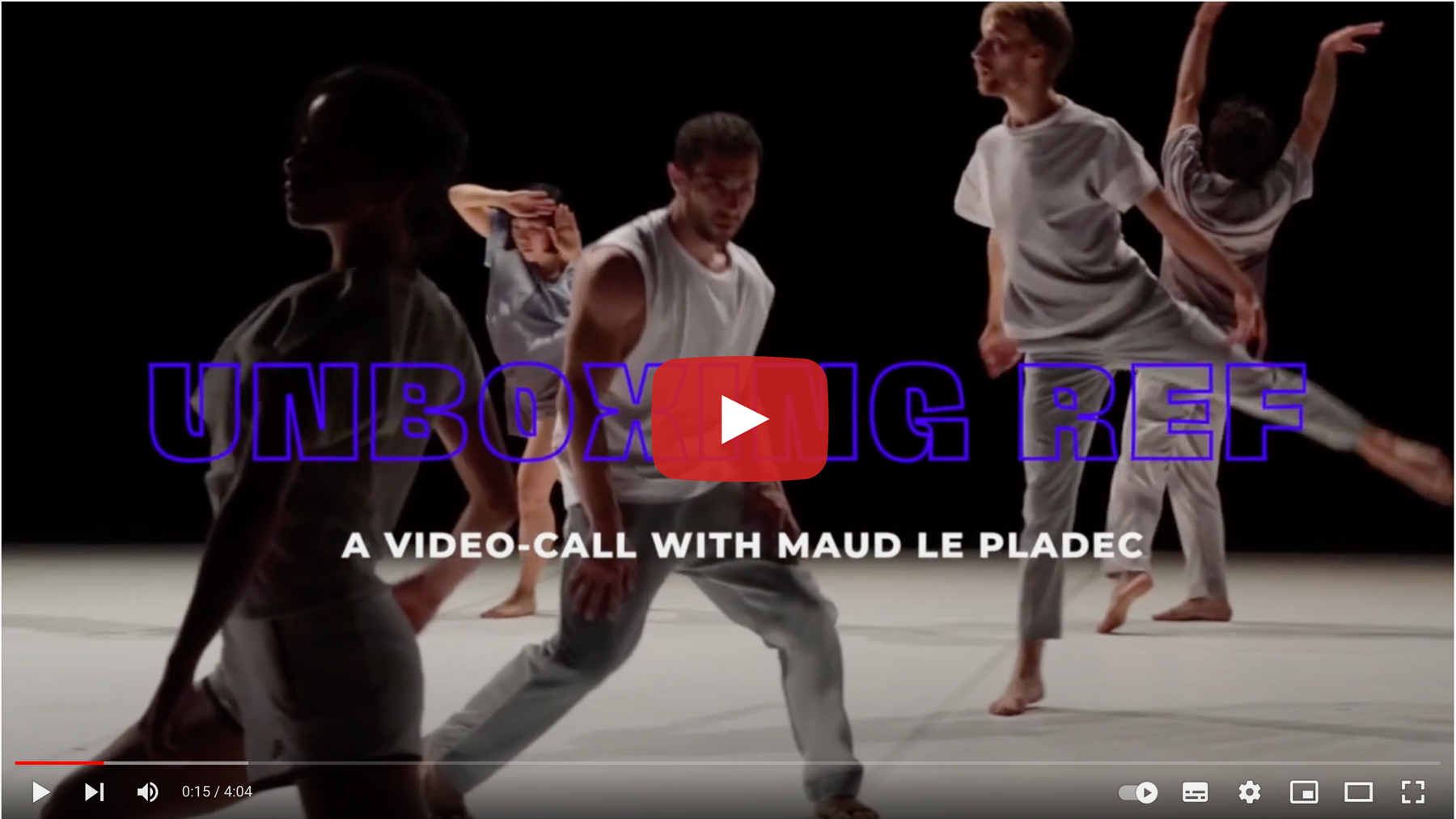ITA/ENG
Il Ref Unboxing di questa settimana continua ad esplorare il rapporto tra danza e musica (e in particolare quella linea legata al minimalismo e al post-minimalismo che attraversa l’intero Romaeuropa Festival 2022) presentando il lavoro di Maud Le Pladec.
Direttrice dal 2017 del Centre Chorégraphique National d’Orléans, la coreografa francese, per la prima volta al festival, ha costruito il suo percorso artistico in costante dialogo con l’universo musicale. Dal pop, alla musica post-minimalista americana, suono, danza e testo hanno sempre trovato un equilibrio nei suoi spettacoli generando una dimensione fortemente percettiva. Ventisette sono le prospettive con le quali la coreografa rilegge un monumento della musica occidentale come la Sinfonia incompiuta No.8 di Schubert. Con la collaborazione del musicista Pete Harden e le scene di Eric Soyer nasce Twenty-Seven Perspectives che Maud Le Pladec ci racconta qui:
«Twenty-Seven Perspectives è la continuazione di un percorso incentrato sulla relazione tra la danza e la musica. Sto lavorando su questo tema da molto tempo e l’incarnazione di questa ricerca cambia a seconda delle differenti pièce che ho prodotto. In Twenty-Seven Perspectives, in particolare, ho voluto affrontare questo dialogo in una forma molto pura. Ho sempre voluto la musica live nelle mie performance; ho collaborato con ensemble Ictus, e con altri grandi ensemble come gli statunitensi Bang on a can all stars. Forte di questa esperienza, ho voluto concentrarmi su una pièce che portasse in scena solo le danzatrici e i danzatori ma che si confrontasse con un enorme capolavoro della storia della musica come è quello di Franz Schubert. Ho collaborato con Pete Harden, compositore e direttore dell’Ensemble Klang. Abbiamo deciso di rivisitare la Sinfonia incompiuta No.8 di Schubert immaginando di ricomporla con le lenti dei compositori post-minimalisti. Abbiamo quindi creato una nuova versione di questa musica basata su 27 variazioni» racconta Le Pladec. Ma ad aspirare la coreografia è anche l’opera 27 esquisses perceptives (27 schizzi percettivi) di Rémy Zaugg. «Ero molto colpita dalla traduzione dell’opera di Cézanne realizzata da Zaugg. È partito da un’opera impressionista per creare un’opera astratta, passando per esempio dall’immagine alle parole. Ho voluto rivisitare l’opera di Schubert alla stessa maniera: una musica che viene da una tradizione diversa, quella classica, e da un’altra epoca è riletta a partire da modalità compositive più vicine al presente. (…) Così come Rémy Zaugg si è appropriato dell’opera di Cézanne, io mi sono appropriata della musica di Schubert e ho cercato di farne una traduzione sulla scena anche dal punto di vista visivo».
Dieci danzatrici e danzatori di provenienze diverse s’incontrano in una sinfonia coreografica dalla costruzione miracolosa che vuole rendere ascoltabile la danza e visibile la composizione sonora.
Continua Maud Le Paldec: «Tutti i performer in scena seguono le differenti variazioni musicali e il modo in cui queste si trasformano. Ognuna/o di loro ha le proprie frasi e una propria traiettoria che inizialmente si sovrappone a quella degli altri creando una sorta di caos. Più la musica va avanti, più ci si avvicina alla vera composizione di Schubert, più queste traiettorie confluiscono in un unisono. Cerco quindi di tradurre sul palco i concetti di armonia e di non armonia, cosa vuol dire procedere insieme e cosa no, e cosa vuol dire danzare su una musica che sembra essere sempre la stessa ma in realtà contiene moltissime variazioni (…). Si può guardare a Twenty-Seven Perspectives da differenti punti di vista: quello musicale, quello coreografico ma anche a partire dal lavoro di Eric Soyer sulle luci e la scena. Volevo partire da una sorta di pagina bianca e lui l’ha letteralmente realizzata: la scena è come un foglio curvo sui bordi».
Ancora una volta la danza e la sua forza accadono come una risposta al presente, come uno spazio dedicato all’ascolto, all’esperienza, alla percezione all’azione di una comunità . Conclude Maud Le Pladec: «Questo spettacolo è stato creato nel 2018, prima della pandemia. Abbiamo interrotto il tour a causa del covid. Abbiamo ripreso a girare quest’anno. So che questa dimensione formale, questa astrazione, che ho difeso strenuamente sin dall’inizio del mio percorso artistico, può sembrare distante da questioni politiche, dal contesto e dalle circostanze in cui ci troviamo e verso le quali stiamo andando (…) mi sono chiesta come questa produzione, creata prima della pandemia, avrebbe risuonato con il mondo di cui facciamo esperienza oggi. Stranamente la purezza, l’impegno delle danzatrici e dei danzatori in un lavoro coreografico così impegnativo, l’astrazione, il fatto che il pubblico possa proiettarsi in essa e che ognuno possa dare la propria interpretazione a questo lavoro, la rendono ancora più forte oggi. (…) Credo molto nel potere della danza».
ENG
This week Ref Unboxing continues to explore the relationship between dance and music (and in particular the link to minimalism and post-minimalism that runs through the entire Romaeuropa Festival 2022) by presenting the work of Maud Le Pladec.
Director of the Center Chorégraphique National d ‘Orléans since 2017, the French choreographer, for the first time at the festival, has built her artistic path in constant dialogue with the musical universe. From pop to American post-minimalist music, sound, dance and text have always found a balance in her performances, generating a strongly perceptive dimension. Twenty-seven are the perspectives with which the choreographer reinterprets a monument of Western music such as Schubert’s Unfinished Symphony No. 8. This is Twenty-Seven Perspective, a work created with the collaboration of the musician Pete Harden and the scenes of Eric Soyer that Maud Le Pladec tells us here:
«Twenty-Seven Perspectives is the continuation of a path focused on the relationship between dance and music. I have been working on this focus for a long time and the embodiment of this research changes according to the different pièce I have produced. In Twenty-Seven Perspectives, in particular, I wanted to approach this dialogue in a very pure form. I’ve always wanted live music in my performances; I have collaborated with Ictus ensemble, and with other great ensembles such as the American Bang on a can all stars. Strengthened by this experience, I wanted to concentrate myself on a piece that would only bring dancers to the stage but that would confront an enormous masterpiece in the history of music such as that of Franz Schubert. I collaborated with Pete Harden, composer and director of Ensemble Klang. We decided to revisit Schubert’s unfinished Symphony No.8 imagining recomposing it with the lenses of post-minimalist composers. We have therefore created a new version of this music based on 27 variations» says Le Pladec.
But the pièce is also inspired by the visual art work 27 Esquisses perceptives by Rémy Zaugg «I was very impressed by Zaugg’s translation of Cézanne’s work. He started from an impressionist work to create an abstract work, passing for example from images to words. I wanted to revisit Schubert’s work in the same way: a music that comes from a different tradition, the classical one, and from another era is reinterpreted starting from compositional methods closer to the present. (…) Just as Rémy Zaugg appropriated Cézanne’s work, I appropriated Schubert’s music and tried to translate it on stage also from a visual point of view». Ten dancers from different backgrounds meet in a choreographic symphony with a miraculous construction that aims to make the dance listenable and the sound composition visible.
Maud Le Paldec continues: «All the performers on stage follow the different musical variations and transformations. Each of them has their own phrases and their own trajectory that initially overlaps with that of the others, creating a sort of chaos. The more the music goes on, the closer you get to Schubert’s true composition, the more these trajectories come together in unison. So, I try to translate the concepts of harmony and non-harmony on stage, what it means to proceed together and what not, and what it means to dance to a music that always seems to be the same but in reality contains many variations (…). You can look at Twenty Seven Perspectives from different points of view: the musical one, the choreographic one but also starting from Eric Soyer‘s work on the lights and the stage. I wanted to start from a sort of blank page, and he literally created it: the scene is like a sheet curved on the edges».
Once again, dance and its strength occur as a response to the present, as a space dedicated to listening, to experience, to the perception and action of a community. Maud Le Pladec concludes: «This show was created in 2018, before the pandemic. We interrupted the tour due to the covid. We started touring again this year. I know that this formal dimension, this abstraction – which I have strongly defended since the beginning of my artistic career – may seem distant from political issues, from the context and circumstances in which we find ourselves and towards which we are going (…) I wondered how this production, created before the pandemic, would resonate with the world we experience today. Strangely, the purity, the commitment of the dancers in such a demanding choreographic work, the abstraction, the fact that the public can project themselves into it and that everyone can give their own interpretation to this work, make it even stronger today. (…) And I strongly believe in the power of dance».
















